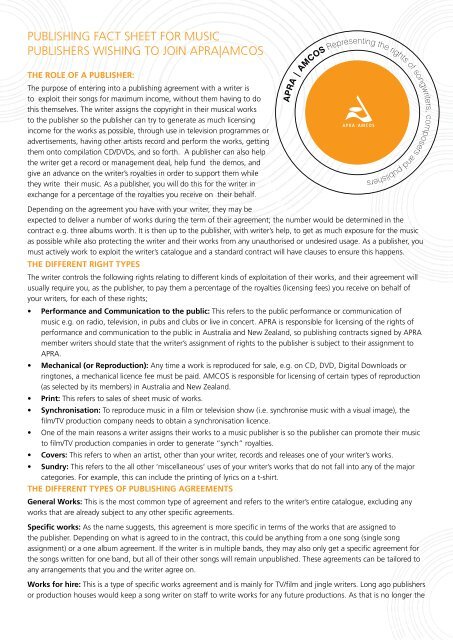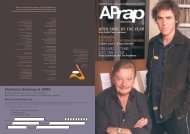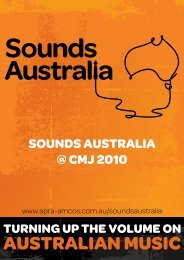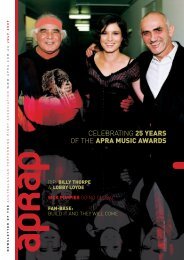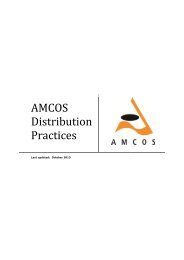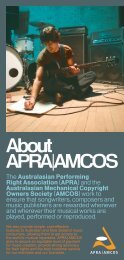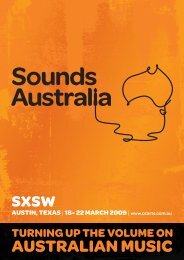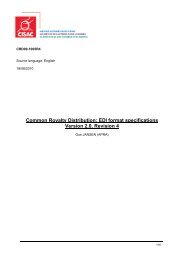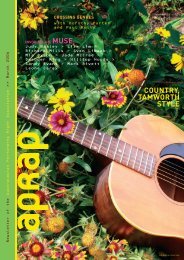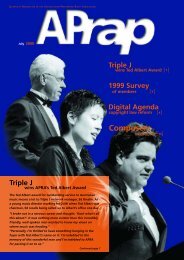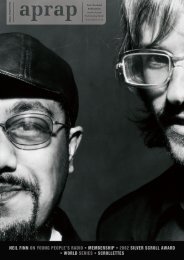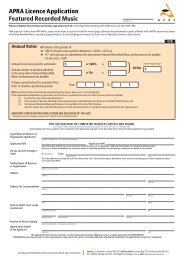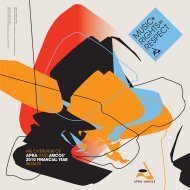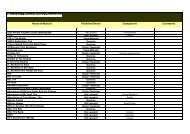Publishing Fact sheet For music Publishers wishing to join aPra|amcos
Publishing Fact sheet For music Publishers wishing to join aPra|amcos
Publishing Fact sheet For music Publishers wishing to join aPra|amcos
Create successful ePaper yourself
Turn your PDF publications into a flip-book with our unique Google optimized e-Paper software.
<strong>Publishing</strong> <strong>Fact</strong> Sheet for <strong>music</strong><br />
publishers <strong>wishing</strong> <strong>to</strong> <strong>join</strong> APRA|AMCOS<br />
The role of a publisher:<br />
The purpose of entering in<strong>to</strong> a publishing agreement with a writer is<br />
<strong>to</strong> exploit their songs for maximum income, without them having <strong>to</strong> do<br />
this themselves. The writer assigns the copyright in their <strong>music</strong>al works<br />
<strong>to</strong> the publisher so the publisher can try <strong>to</strong> generate as much licensing<br />
income for the works as possible, through use in television programmes or<br />
advertisements, having other artists record and perform the works, getting<br />
them on<strong>to</strong> compilation CD/DVDs, and so forth. A publisher can also help<br />
the writer get a record or management deal, help fund the demos, and<br />
give an advance on the writer’s royalties in order <strong>to</strong> support them while<br />
they write their <strong>music</strong>. As a publisher, you will do this for the writer in<br />
exchange for a percentage of the royalties you receive on their behalf.<br />
Depending on the agreement you have with your writer, they may be<br />
expected <strong>to</strong> deliver a number of works during the term of their agreement; the number would be determined in the<br />
contract e.g. three albums worth. It is then up <strong>to</strong> the publisher, with writer’s help, <strong>to</strong> get as much exposure for the <strong>music</strong><br />
as possible while also protecting the writer and their works from any unauthorised or undesired usage. As a publisher, you<br />
must actively work <strong>to</strong> exploit the writer’s catalogue and a standard contract will have clauses <strong>to</strong> ensure this happens.<br />
The different right types<br />
The writer controls the following rights relating <strong>to</strong> different kinds of exploitation of their works, and their agreement will<br />
usually require you, as the publisher, <strong>to</strong> pay them a percentage of the royalties (licensing fees) you receive on behalf of<br />
your writers, for each of these rights;<br />
• Performance and Communication <strong>to</strong> the public: This refers <strong>to</strong> the public performance or communication of<br />
<strong>music</strong> e.g. on radio, television, in pubs and clubs or live in concert. APRA is responsible for licensing of the rights of<br />
performance and communication <strong>to</strong> the public in Australia and New Zealand, so publishing contracts signed by APRA<br />
member writers should state that the writer’s assignment of rights <strong>to</strong> the publisher is subject <strong>to</strong> their assignment <strong>to</strong><br />
APRA.<br />
• Mechanical (or Reproduction): Any time a work is reproduced for sale, e.g. on CD, DVD, Digital Downloads or<br />
ring<strong>to</strong>nes, a mechanical licence fee must be paid. AMCOS is responsible for licensing of certain types of reproduction<br />
(as selected by its members) in Australia and New Zealand.<br />
• Print: This refers <strong>to</strong> sales of <strong>sheet</strong> <strong>music</strong> of works.<br />
• Synchronisation: To reproduce <strong>music</strong> in a film or television show (i.e. synchronise <strong>music</strong> with a visual image), the<br />
film/TV production company needs <strong>to</strong> obtain a synchronisation licence.<br />
• One of the main reasons a writer assigns their works <strong>to</strong> a <strong>music</strong> publisher is so the publisher can promote their <strong>music</strong><br />
<strong>to</strong> film/TV production companies in order <strong>to</strong> generate “synch” royalties.<br />
• Covers: This refers <strong>to</strong> when an artist, other than your writer, records and releases one of your writer’s works.<br />
• Sundry: This refers <strong>to</strong> the all other ‘miscellaneous’ uses of your writer’s works that do not fall in<strong>to</strong> any of the major<br />
categories. <strong>For</strong> example, this can include the printing of lyrics on a t-shirt.<br />
The different types of publishing agreements<br />
General Works: This is the most common type of agreement and refers <strong>to</strong> the writer’s entire catalogue, excluding any<br />
works that are already subject <strong>to</strong> any other specific agreements.<br />
Specific works: As the name suggests, this agreement is more specific in terms of the works that are assigned <strong>to</strong><br />
the publisher. Depending on what is agreed <strong>to</strong> in the contract, this could be anything from a one song (single song<br />
assignment) or a one album agreement. If the writer is in multiple bands, they may also only get a specific agreement for<br />
the songs written for one band, but all of their other songs will remain unpublished. These agreements can be tailored <strong>to</strong><br />
any arrangements that you and the writer agree on.<br />
Works for hire: This is a type of specific works agreement and is mainly for TV/film and jingle writers. Long ago publishers<br />
or production houses would keep a song writer on staff <strong>to</strong> write works for any future productions. As that is no longer the
norm, a “works for hire” agreement is now made. In this agreement the writer is signed <strong>to</strong> a deal for a certain term, e.g.<br />
five years and will be paid periodic advances throughout the term, and in return the writer will deliver a minimum number<br />
of works.<br />
Definitions<br />
Term of agreement - this refers <strong>to</strong> length or duration of the agreement and how long the publisher has control of the<br />
writer’s works. Whether it is for “Life of Copyright”, or a number of years, the agreement should have the term listed.<br />
Many agreements state that the term is for an initial duration, but au<strong>to</strong>matically extends from year <strong>to</strong> year until terminated<br />
in writing by either party (subject <strong>to</strong> recoupment of advances).<br />
Retentions - Once an agreement has been ‘terminated’, the publisher may still retain copyright in the works for a certain<br />
period. This is usually when advances have not yet been recouped, or the contract states the publisher retains the works<br />
for a set period after the termination, or it was in the original contract that the works delivered during the term were <strong>to</strong> be<br />
retained for the life of copyright but the publisher no longer acquires any new works by the writer following termination.<br />
Advance - A publisher will usually pay a sum of money <strong>to</strong> a writer when they are first signed. This is <strong>to</strong> help with expenses<br />
while the writer is composing works. The advance is viewed as a type of loan, and is expected <strong>to</strong> be recouped by the<br />
publisher. It is a pre-payment of the writer’s royalties.<br />
Recoupment - the ‘advance’ is expected <strong>to</strong> be paid back through recoupment of the royalties earned by the published<br />
works. However, other expenditure on the writer may also be viewed as recoupable, and this should be agreed <strong>to</strong> by<br />
both parties and not just added <strong>to</strong> the writer’s royalty account without their knowledge. As works earn royalties, the<br />
publisher will keep all royalties they receive, or a percentage of these, until the sum of the advance/agreed expenditure<br />
has been paid back. Once the publisher has recouped advances paid <strong>to</strong> the writer, they will then pay the writer the shares<br />
of royalties originally agreed <strong>to</strong> in the contract. If the songs do not generate any money, the advance and expenditure is<br />
never recouped.<br />
Schedule - This is a list of works that are subject <strong>to</strong> the publishing agreement, usually at the back of the contract. <strong>For</strong><br />
general works agreements, it is unders<strong>to</strong>od that the schedule only lists those works assigned at the commencement of the<br />
agreement, and it is the writer’s responsibility <strong>to</strong> advise the publisher of additional works they write during the term of the<br />
agreement so that the publisher can register these works with APRA|AMCOS and begin <strong>to</strong> promote and license them.<br />
Terri<strong>to</strong>ry - This refers <strong>to</strong> the regions of the world in which the publisher acquires the copyright in the writer’s works. Most<br />
publishers will try <strong>to</strong> sign a writer <strong>to</strong> an agreement for the World/Universe, but others may only sign a writer for individual<br />
countries or terri<strong>to</strong>ries.<br />
How publishing is administered by APRA|AMCOS<br />
Agreements with publisher members of APRA:<br />
If a writer signs a publishing agreement with an APRA member, for example yourself if you are elected <strong>to</strong> membership,<br />
then your company would register the agreement with APRA|AMCOS, and we would credit you as publisher on our<br />
ownership records for the appropriate works, so you receive a share of the works’ royalties (usually 50% of performing<br />
right royalties and 100% of mechanical right royalties). The percentages that you collect from APRA and AMCOS are not<br />
<strong>to</strong> be confused with the percentages for each right type that the agreement requires you <strong>to</strong> on-pay <strong>to</strong> the writer out of<br />
royalties you receive.<br />
If a writer signs a general works agreement with you, they need <strong>to</strong> notify you of any new works they write during the<br />
term of their agreement, so you can register them with APRA.<br />
Note: In <strong>music</strong> business terminology, works are only “published” if a writer has assigned them <strong>to</strong> a <strong>music</strong> publisher in a<br />
publishing agreement/contract. Releasing songs on CD or DVD does not mean that they are “published”.<br />
membership enquires<br />
Phone 1800 642 634<br />
Publisher@apra.com.au<br />
www.apra-amcos.com.au<br />
NSW Head office<br />
16 Mountain St<br />
Ultimo NSW 2007<br />
P: 61 2 9935 7900<br />
VIC/TAS<br />
3 & 5 Sanders Pl<br />
Richmond VIC 3121<br />
P: 61 3 9426 5200<br />
QLD<br />
3 Winn St<br />
<strong>For</strong>titude Valley QLD 4006<br />
P: 61 7 3257 1007<br />
SA<br />
Suite 29/8-20 O’Connell St<br />
North Adelaide SA 5006<br />
P: 61 8 8239 2222<br />
NT<br />
GPO Box 4519<br />
Darwin NT 0801<br />
P: 0447 447 646<br />
WA<br />
Suite 1/12-20 Railway Rd<br />
Subiaco WA 6008<br />
P: 61 8 9382 8299


